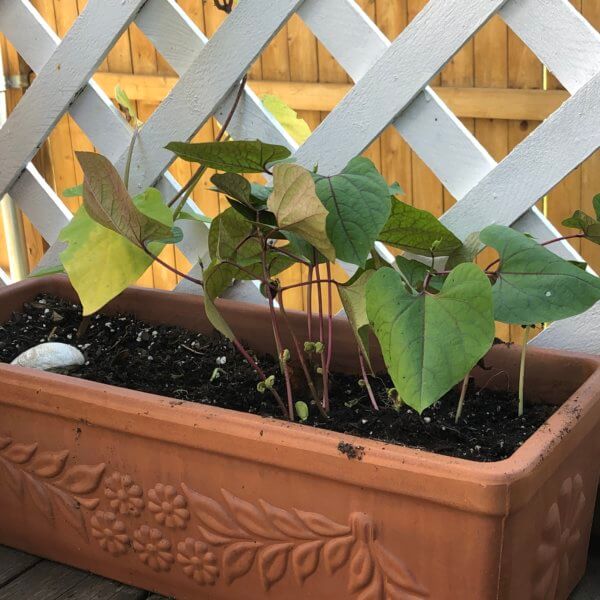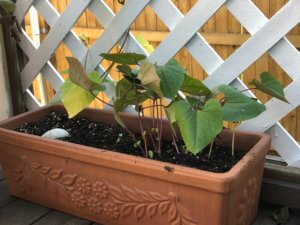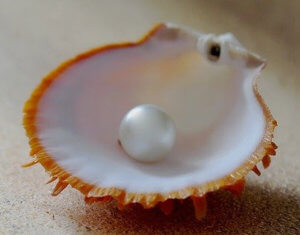
Selling All
 Jesus put before the crowds another parable: “The kingdom of heaven is like a mustard seed that someone took and sowed in his field; it is the smallest of all the seeds, but when it has grown it is the greatest of shrubs and becomes a tree, so that the birds of the air come and make nests in its branches.”
Jesus put before the crowds another parable: “The kingdom of heaven is like a mustard seed that someone took and sowed in his field; it is the smallest of all the seeds, but when it has grown it is the greatest of shrubs and becomes a tree, so that the birds of the air come and make nests in its branches.”
He told them another parable: “The kingdom of heaven is like yeast that a woman took and mixed in with three measures of flour until all of it was leavened.”
“The kingdom of heaven is like treasure hidden in a field, which someone found and hid; then in his joy he goes and sells all that he has and buys that field.
“Again, the kingdom of heaven is like a merchant in search of fine pearls; on finding one pearl of great value, he went and sold all that he had and bought it.
“Again, the kingdom of heaven is like a net that was thrown into the sea and caught fish of every kind; when it was full, they drew it ashore, sat down, and put the good into baskets but threw out the bad. So it will be at the end of the age. The angels will come out and separate the evil from the righteous and throw them into the furnace of fire, where there will be weeping and gnashing of teeth.
“Have you understood all this?” They answered, “Yes.” And he said to them, “Therefore every scribe who has been trained for the kingdom of heaven is like the master of a household who brings out of his treasure what is new and what is old.”
I am so grateful to Della Wells for inviting me to preach these last two Sundays. It’s a privilege to delve much more deeply into the scriptures, and share thoughts about them.
Hyacinth Seeds
 Some weeks ago a friend of my Beloved’s sent her some hyacinth seeds. Claudia stuck them in a pot on the deck that was mostly empty and forgot about them. Suddenly this week she called excitedly, “come quick”! They had sprouted. And in a couple of days they’ve grown to be four inches high and covered with leaves!
Some weeks ago a friend of my Beloved’s sent her some hyacinth seeds. Claudia stuck them in a pot on the deck that was mostly empty and forgot about them. Suddenly this week she called excitedly, “come quick”! They had sprouted. And in a couple of days they’ve grown to be four inches high and covered with leaves!
That reminded me a passage from a great book I read a while back: Lab Girl, a memoir by Hope Jahren. She’s a 40-something professor of earth sciences at the University of Oslo, who grew up in small-town southern Minnesota.
The book is hilarious, heartbreaking, and mind expanding about the wonders of the plant world. Here’s a sample from her brief meditation on a seed.
“A seed knows how to wait. Most seeds wait for at least a year before starting to grow; a cherry seed can wait for a hundred years with no problem. What exactly each seed is waiting for is known only to that seed….”
 What a metaphor! It made me think about “seeds” in my own life that waited so long to sprout: the seed of faith, for example; the seed of priestly vocation; the seed of commitment to another person in marriage.
What a metaphor! It made me think about “seeds” in my own life that waited so long to sprout: the seed of faith, for example; the seed of priestly vocation; the seed of commitment to another person in marriage.
Metaphor helps us understand the world and ourselves. Metaphor is essential to the “explanation” of anything immaterial, invisible, or transcendent.
Like love.
Like the Kingdom of Heaven.
The Kingdom of Heaven
Jesus knows the kingdom of heaven. To him, it’s more than a vision. It’s the living reality of union with God. Jesus wants to share it with the people around him–particularly his closest followers. He does so in the only way he can: through metaphor, in stories and images.
In the last couple of weeks, Jesus’ Kingdom of Heaven parables were longer stories. Today’s are short, simple images; they more quickly grab our imaginations and emotions.
In the first two, Jesus used irony that is lost to us. Everybody then knew that a mustard plant was a bush and an invasive weed, not a great tree to be admired. As for yeast: it was a symbol of corruption. Jesus’ likening them to the Kingdom of Heaven must have surprised and confused his original audiences. But, then, the in-breaking of the Kingdom may well surprise us all.
Hidden Treasure
 In the next two images, Jesus engages our curiosity and excitement. Who can resist stories of hidden valuables?
In the next two images, Jesus engages our curiosity and excitement. Who can resist stories of hidden valuables?
“The kingdom of heaven is like treasure hidden in a field, which someone found and hid; then in his joy he goes and sells all that he has and buys that field.
“Again, the kingdom of heaven is like a merchant in search of fine pearls; on finding one pearl of great value, he went and sold all that he had and bought it.
Both of those spoke to me, for instance. But it is not about the having, the owning. Instead it’s about the giving, the total surrender, selling all that you have.
Is there anything so precious to you that you would give away everything for it?
That’s the way I felt eleven years ago when my youngest sister Polly told me she was dying of cancer. I would have given anything–beginning with my own life–to save hers.
Today, I still would–in a heartbeat.
That’s Jesus’ point, isn’t it? That’s the depth of connection and commitment that Jesus wants us to feel. Jesus wants us to seek the kingdom, loving union with God, with that intensity, that passion, that total abandon–just as Jesus has.
Connection
It’s remarkable that we can still connect with some of Jesus’ teachings–given the enormous gulf of time and culture between us. We have next to nothing in common with the people of first- century Palestine.
Their lives were simple, hard, short, and full of risk. In addition, they were oppressed by the Roman imperial system that taxed them heavily, leaving them little on which to survive.
Two of the things we do share with them are what make Jesus’ teachings universal, and compelling to us all.
 The first thing is the human tendency to be preoccupied: mulling over the past, worrying about the future. Jesus’ disciples were probably mostly preoccupied with day to day survival. Covid has brought that threat closer to many today than ever before. But we also can be distracted by minor things. Whatever they are, our preoccupations keep us from being present to the presence of God. So Jesus calls us to be awake, alive to the treasure of God–the kingdom of heaven in our very midst.
The first thing is the human tendency to be preoccupied: mulling over the past, worrying about the future. Jesus’ disciples were probably mostly preoccupied with day to day survival. Covid has brought that threat closer to many today than ever before. But we also can be distracted by minor things. Whatever they are, our preoccupations keep us from being present to the presence of God. So Jesus calls us to be awake, alive to the treasure of God–the kingdom of heaven in our very midst.
The second thing we have in common with Jesus’ contemporaries is that we all suffer. Suffering is an inescapable part of life, of the human condition.
St. Paul took this truth head on in the fifth chapter of his letter to the Romans:
‘…we[c] boast in our hope of sharing the glory of God. 3 And not only that, but we[d] also boast in our sufferings, knowing that suffering produces endurance, 4 and endurance produces character, and character produces hope, 5 and hope does not disappoint us, because God’s love has been poured into our hearts through the Holy Spirit that has been given to us.’
Across That Bridge
John Lewis, a hero of the Civil Rights movement who died a week ago, drew courage from scriptures like that. And he drew strength from generations of his forebears’ faith in the face of suffering and adversity. In his memoir, Across that Bridge, Lewis wrote:
‘…our parents stayed on their knees and made sure we learned to pray… we were already familiar with the power of divine grace that would meet us in our darkest hour ….We called it “making a way out of no way.” So when we were standing in protest facing police dogs and fire hoses, we knew without any doubt that somebody who was greater than us all would make a way out of no way and protect the defenders of the truth.’
Private, personal suffering may also draw us to a more intimate encounter with God, as it did for Simone Weil, the early-20th century French mystic, in agony from chronic migraines. [1] In her journal, she wrote: ‘neither my senses nor my imagination had any part [in the experience]. I only felt in the midst of my suffering the presence of a love, like that which one can read in the smile on a beloved face.’
These testimonies, spanning nearly two millennia, proclaim the truth of God’s presence in suffering, a love whose power strengthens us for whatever trial we might have to endure.
Union with God, with the boundless blessing of God’s love here on earth, is the treasure buried in the field of each person’s soul That is the treasure for which Jesus invites us to give everything we have, opening up the space for the Holy Spirit to pour God’s love into our hearts.
May God give us the grace, the wisdom, the resolve to seek the treasure of that union, that love, with all of our might. Amen.
[1] Eric Springsted, from Simone Weil and the Suffering of Love.
